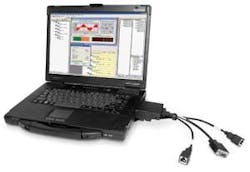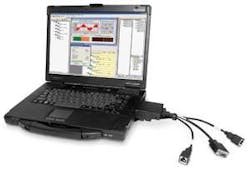Demand for avionics test systems is steady despite economic challenges
ByJohn McHale
EVERETT, Wash.–Designers of avionics test systems say they are excited about technology investment and comforted by steady military contract wins despite the slow commercial aviation market.
“Military bookings are much greater than commercial, but commercial aviation customers are still placing orders,” says Bill Schuh, vice president of sales at Ballard Technology in Everett, Wash.
“The economy has had an effect on just about all segments of the market and we see challenges across the board, but also increased opportunity with new technology making its way into the market such as time-triggered networking and VPX technology,” says Ben Daniel, business director Avionics Group at GE Fanuc Intelligent Platforms in Santa Barbara, Calif.
Avionics test systems designed for rugged military environments can be more expensive, Schuh says. However, commercial aviation integrators are still buying his company’s commercial off-the-shelf (COTS) products because at the end of the day, they are more reliable and much less expensive than a custom, one time design, he adds. The Ballard BusBox board has been well received because despite its cost, it is “quieter than anything out there for in-flight testing,” Schuh notes.
“We are seeing more of a demand for integrated test and measurement systems with an emphasis on portable, full-featured test systems that can be quickly deployed on the ground and in the air,” GE Fanuc’s Daniel says. “Rather than try to cobble a test system together with products from several suppliers, which may not be easy to integrate together, our customers want a test system that just works right from the beginning.”
Daniel says end users of their test systems “are looking for an integrated portable system and our BTP series analyzers for all three avionics protocols are powerful integrated test packages with the analysis software, avionics interface card, a semi-rugged portable computer host, and cables for immediate use with no integration issues.”
GE Fanuc’s BTP-1553 uses BusTools/1553 Analysis, Test, and Simulation Software–an integrated, Windows-based application solution for MIL-STD-1553 test, analysis, and simulation, according to the GE Fanuc Web site. The system also uses a GUI interface to enable quick monitoring and analyzing of bus traffic as well as display multiple real-time engineering unit values and user-formatted graphs.
For 1553 avionics test applications, engineers at Data Device Corp. (DDC) in Bohemia, N.Y., have designed the BU-67103U USB, a portable off-the-shelf device, says Amir Massumi, marketing director at DDC. Massumi says the military market has been quite steady for DDC as well.
Military business has also been fruitful for test suppliers Aeroflex in Plainview, N.Y., and ITCN in Dayton, Ohio. Both companies announced military design wins in September.
ITCN won an Air Force contract that will allow the company to continue its development and transitioning of the BCIT (Bus Characterization and Integrity Toolset) from a prototype to a commercial product, according to an ITCN release.
The U. S. Department of Defense (DOD) awarded Aeroflex a five-year, $40.5 million contract with the U.S. Marine Corps to supply Ground Radio Maintenance Automatic Test Systems (GRMATS), according to an Aeroflex release. For this contract, Aeroflex will supply its newly developed test platform, the 7200 Configurable Automated Test Set (CATS). The 7200 is a COTS platform for testing software-defined radios, including military tactical radios and other high-technology devices.
“With its modular, standards-based design, the 7200 CATS makes radio testing future-proof,” says Jeff Gillum, vice president and general manager, Aeroflex Wichita in the release. “We can test any radio standard today and within the same bench-top box, change test capabilities for any radio or module technology planned for future deployment.”
More Military & Aerospace Electronics Current Issue Articles
More Military & Aerospace Electronics Archives Issue Articles

